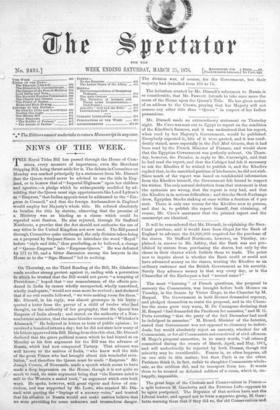The most " burning " of French questions, the proposal
to amnesty the Communists, was brought before both Houses on Tuesday, in the Senate by Victor Hugo, in the Chamber by M.. Respell. The Government in both Houses demanded urgency, and pledged themselves to resist the proposal, and in the Cham- ber the scene grew very warm, M. De Cassagnac declaring that M. Raspail "had demanded the Pantheon for assassins," and M. G. Perin retorting "that the party of the 2nd December' had need be indulgent to assassins." M. Ricard, Minister of the Interior, stated that Government was not opposed to clemency to indivi- duals, but would absolutely reject an amnesty, whether for all Communists, or for all Communists not convicted of civil offences. M. Hugo's proposal amnesties, in so many words, "all crimes g committed during the events of March, April, and May, 1871, and will undoubtedly be rejected by both Houses, though the minority may be considerable. France is, as often happens, all on one side in this matter, but then Paris is on the other. Parisians think it, in fact, unfair to slaughter Communists whole- sale, as the soldiers did, and 'to transport them too. It wants them to be treated as defeated soldiers of a cause, which is, un- happily, impossible.


































